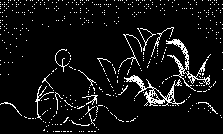A Poem and Pictograph in Earth Language( EL ) for this month -- April
'02 --

 .
.  .
.  .
. 
 .
. 

This is
an EL( Earth Language ) experimental page to enjoy the image/meaning of
a short poem originally in English/ Japanese. When you can't see the
Japanese parts, please skip them.
For this month, I chose a haiku by Sean Lause
who is an English teacher in Ohio. It's in the web site "
Haiku Harvest 2001B" edited by Denis Garrison*.
Daytime is getting longer and longer, and for a while
after dark, the air is not cold any more. In that atmosphere, there
is a moment when a peaceful feeling and joy of life come up. I recall
the moment through this haiku; especially by the quiet sound of innocent ducks.
Ducks usually symbolize 'winter' in a haiku. But I feel 'spring' better fit
the total image of this haiku.
By the way, though I'm not a duck, I like to taste and enjoy
spring grasses. Now here in Bay Area, CA, Miner's lettuce, Nasturtium
and wild onions are soft and good in a salad, giving us the spring earth
energy.
今月は、オハイオで英語の先生をなさっているSean Lauseさんの俳句を"
Haiku Harvest 2001B"から取り上げます。どんどん日が長くなり、暮れてもしばらく冷えない空気のなか、しずかな平和につつまれることがあります。とりわけ鴨たちが無心に食べているかすかな音がいのちの喜びをふいに湧かせる・・そんな気分に私も誘われました。
ところで鴨じゃありませんが私も春の野草をたべるのが大好きです。ここカリフォルニアでは日本とは香りがちがいますが、ここでも野の花や草のサラダを楽しんでます。
大地から春のエネルギーをもらえるような気がして。
 Original
Haiku:
Original
Haiku:
dark lake,
the only sounds -- my breaths --
ducks nibbling the weeds
In Japanese:
暗い湖(うみ)わが息・鴨はむ草の音
In EL:















 {08
{08 ( little ),{02,23}
( little ),{02,23} ( light )}:
less light, dark( not completely ) (うす暗い)
( light )}:
less light, dark( not completely ) (うす暗い)
 {10
{10 ( place ),37
( place ),37 ( nature ),47( holding ),59
( nature ),47( holding ),59 ( water )}: lake (湖)
( water )}: lake (湖)
 {02( one
),11
{02( one
),11 ( limitation )}: only (のみ、だけ)
( limitation )}: only (のみ、だけ)
 : {36
: {36 ( time ),42
( time ),42 (
wave )}: sound ( a sort of wave recognized by 'ear' and with 'time' ) (音)
(
wave )}: sound ( a sort of wave recognized by 'ear' and with 'time' ) (音)
.. 
 .. : multiple instances of #01 are used to indicate a pause
.. : multiple instances of #01 are used to indicate a pause
(複数のは間(ま)を表す。オリジナルに沿って、これを使ってみた)
 {62( back
),34( pronoun )}( this hand sign points the center of the chest by the thumb
): I, my, me ( by its position ); in this case this means "my", modifying
the next noun as the position; (私の)
{62( back
),34( pronoun )}( this hand sign points the center of the chest by the thumb
): I, my, me ( by its position ); in this case this means "my", modifying
the next noun as the position; (私の)
 {67
{67 ( life ),{70,42}
( life ),{70,42} ( wind ),19( in ),20(
out )}: breath(s)/ respiration (呼吸)
( wind ),19( in ),20(
out )}: breath(s)/ respiration (呼吸)
 {{41( move ),70( air/
space ),23}
{{41( move ),70( air/
space ),23} ( 'bird' by
the shape; as a fundamental character ),42( wave/ flowing water )}: water
bird (水鳥)
( 'bird' by
the shape; as a fundamental character ),42( wave/ flowing water )}: water
bird (水鳥)
 {gc( preposition ),gd(
d-verb )}: like a verb + ing in English, this verb modifies the front word
(D動詞を構成して前の語を修飾する)
{gc( preposition ),gd(
d-verb )}: like a verb + ing in English, this verb modifies the front word
(D動詞を構成して前の語を修飾する)
 {{04,39}
{{04,39} ( 'mouth' by the symbol shape ),24( hard )}}: beak(s) (くちばし)
( 'mouth' by the symbol shape ),24( hard )}}: beak(s) (くちばし)
 47: receive
(受ける)
47: receive
(受ける)


 : nibbling ( with the beaks ) (くちばしでつついて食べる)
: nibbling ( with the beaks ) (くちばしでつついて食べる)
 30: to show
that the following is an accusative case of a verb (次語が動詞の対象格と示す)
30: to show
that the following is an accusative case of a verb (次語が動詞の対象格と示す)
 {23,66( plant
)}: grass(es)( a fundamental character by the shape ) (草)
{23,66( plant
)}: grass(es)( a fundamental character by the shape ) (草)
( numbers are for each basis )
* Denis Garrison was an Academic Director of the
World Haiku Club and an editor for the
World Haiku Review . If you are interested in trying to make haiku,
I recommend you visit WHC.
When a haiku is in English, it has its English rhythm. When it's translated
into another language, the original rhythm and some details can't be the
same. Here the EL translation shows the image of a haiku/ poem, keeping the
original sound as it is. But originally EL poems must be interesting with
the visual rhythm, read in each language vocally. I'm looking forward to
enjoying this way with others.
日本人のみなさま、英語俳句に挑戦してみませんか?
World Haiku Clubの創始者でイギリス在住の瀧口進さんが、
「英語俳句を作ろう!」のウェブサイトを開設しておられます。これを読むと、きっと試みたくなると思います。感性を育てながら、文化を越えて伝わるこころを探るおもしろさがあります。
瀧口さんが、英語俳句には最初から英語でイメージするほうがいいと述べておられるように、地球語の詩も(音声的にはそれぞれの母語の感覚に任せて)最初からビジュアルに表現するのが本当は肝腎だと思います。地球語利用の詩人たちが育てば、独特の形体も整ってくるかもしれません。でも今のところは、他の言語で表された内容をシンボルで伝えているだけです。英語の俳句を読むときには、英語の音声を味わいながら、意味を感じ取ってもらおうと地球語は働いています。
To the top
 Original
Haiku:
Original
Haiku:







 ( little ),{02,23}
( little ),{02,23} ( light )}:
less light, dark( not completely ) (うす暗い)
( light )}:
less light, dark( not completely ) (うす暗い) (
wave )}: sound ( a sort of wave recognized by 'ear' and with 'time' ) (音)
(
wave )}: sound ( a sort of wave recognized by 'ear' and with 'time' ) (音)
 ( wind ),19( in ),20(
out )}: breath(s)/ respiration (呼吸)
( wind ),19( in ),20(
out )}: breath(s)/ respiration (呼吸) ( 'bird' by
the shape; as a fundamental character ),42( wave/ flowing water )}: water
bird (水鳥)
( 'bird' by
the shape; as a fundamental character ),42( wave/ flowing water )}: water
bird (水鳥) ( 'mouth' by the symbol shape ),24( hard )}}: beak(s) (くちばし)
( 'mouth' by the symbol shape ),24( hard )}}: beak(s) (くちばし) 47: receive
(受ける)
47: receive
(受ける) 30: to show
that the following is an accusative case of a verb (次語が動詞の対象格と示す)
30: to show
that the following is an accusative case of a verb (次語が動詞の対象格と示す)